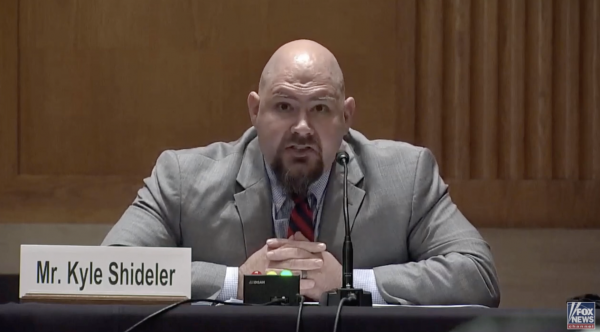Well-meaning Americans are being suckered into an illiberal political cabal.
Undoing the Court’s Supreme Transgression

Bostock demands a complete change of course from neutered judicial “conservatism.”
On Tuesday, Josh Hawley (R-Mo.) took to the floor of the United States Senate to declare “the end of the conservative legal movement, or the conservative legal project, as we know it.” In responding to Monday’s unfortunate Title VII Supreme Court ruling, which erroneously read both sexual orientation and so-called transgenderism into our most hallowed civil rights statutory edifice, Hawley spoke as a graduate of America’s most prestigious law school, a former law clerk to Chief Justice John Roberts, and a highly decorated conservative constitutional attorney.
In short, Josh Hawley spoke with knowledge and authority. It shows, because truer words have not been spoken in ages.
There is no escaping the takeaway of Bostock v. Clayton County, Georgia, in which Federalist Society-vetted “originalist” golden boy Neil Gorsuch became the latest member of the ignominious list of Republican nominees at the Court to cave on a civilization-defining cultural issue. That conclusion is both stark and depressing: The conservative legal movement, with all its attendant institutions, theories, and pedagogies, has failed conservatism.
When even a putative “textualist”—let alone inheritor of Antonin Scalia’s Court seat—concludes that the scientific truth of sexual duality and the linguistic truth of biologically accurate pronouns must yield to a conception of “sex” unheard of throughout millennia of human existence, then one must agree with Hadley Arkes that such a theory of law is “morally empty.” There is no reasonable alternative.
One hearkens back to the old Einstein maxim about how insanity is “doing the same thing over and over and expecting different results.” When, if ever, will we actually listen? For decades now, the Court’s progressives vote in unison as a sexual liberationist bloc. The only interesting question, in a given case, is which Republican judicial nominee—no doubt employing a morally neutered, “David French-ist” methodology of brute proceduralism—will become the “useful idiot” du jour. Not even the Trump administration’s ostensibly nonpareil judicial nominations machine is apparently capable of reversing the trend.
We are in dire need of a complete change of course.
Reform legal education
First-year law students are traditionally introduced to all the great common law and public law subjects, such as property, torts, contracts, criminal law, and constitutional law. But nowhere is there any pedagogical emphasis on the primary truths and axioms that undergird the entirety of the legal canon in our Anglo-American constitutional order: namely, the Bible and the natural law intellectual tradition. Curious. To attempt to instill an appreciation for the American founding and English common law without first instilling an appreciation for the moral truth that undergirds that tradition amounts to a necessarily doomed project. Many students lack the building blocks needed to intuit and comprehend our legal order. Legal education should reform itself accordingly: biblical and natural law principles ought to be infused into the curricula of each and every one of these building block subjects.
Move on to constitutional law—an area that has seen a flurry of recent commentary. Some, no doubt anticipating Gorsuch’s Title VII capitulation, have presciently laid the groundwork for an entirely post-originalist jurisprudence. But this is a remedy just a tad too extreme for our present doldrums; our American constitutional order was predicated upon the notion that law qua law entails “right” and “wrong” answers, and we must fight to reassert that foundation in a way that is cognizant of our past and clear-eyed about our future.
But to do so, we must change the way that originalist jurisprudence is discussed in the legal academy and inculcated in impressionable young conservative legal minds. No longer can we accept a professed equal legitimacy of competing varieties of constitutional interpretation that all purport to be “originalist” in nature. No longer can we celebrate the purely non-substantive triumph of a particular genre of procedure. If originalism is to survive as an intellectually tenable and normatively defensible theory of jurisprudence, then the only viable path forward is a “common good originalism” that is rooted in a text’s original public meaning but argumentatively proceeds along lines of natural justice and our underlying moral traditions.
Finally, the conservative legal movement must work to reform its own institutions and practices. In addition to ostracizing libertarian-leaning legal norms as having no place in either “common good originalism” or the overarching Anglo-American conservative tradition from which it is derived, the Federalist Society and other leading institutional actors must reform their practices at the highest level—namely, that of helping recommend Supreme Court nominees to Republican presidential administrations.
In order to forestall “Greenhouse Effect” juridical drift, future nominees should have an actual firm cap placed on the number of years (perhaps five) physically spent living inside the Beltway. Furthermore, there should be a hard moratorium placed on nominating Harvard Law School and Yale Law School graduates to the Court; although this is both over- and under-inclusive as a remedy, it is nonetheless imperative that we curate a more representative cross-section of the legal profession.
Perhaps most important, we should temporarily pause on selecting as nominees all those whose scholarly focus is solely on deconstructing the administrative state. The administrative state needs deconstructing. But the sad reality is that the “monolithic anti-administrative state cabal” accounts for too many of the donor dollars and influence that wag the larger conservative legal movement. The tragic tale of Neil Gorsuch evinces the gaping moral void potentially left by those conservative jurists who fawn over gutting the administrative state to the exclusion of all else. Per Josh Hawley’s cri de coeur, in the midst of our present regime crisis, social conservatives deserve to see their civilizational concerns emphasized and brought to the forefront once again.
Bostock was a grievous blow—to religious liberty, human reality, linguistic precision, the Constitution’s separation of powers, and the integrity of the judicial function itself. The long road back must begin somewhere. But first we must stop whatever it is that we have been doing. If we do not radically change course, we will not only consign ourselves to failure, but to the inevitable breakup of the conservative legal movement.
The American Mind presents a range of perspectives. Views are writers’ own and do not necessarily represent those of The Claremont Institute.
The American Mind is a publication of the Claremont Institute, a non-profit 501(c)(3) organization, dedicated to restoring the principles of the American Founding to their rightful, preeminent authority in our national life. Interested in supporting our work? Gifts to the Claremont Institute are tax-deductible.
Don’t let the commies win.
This is the Right’s greatest opportunity in decades. Will we take it?
Remarks before the Senate Judiciary Committee by Kyle Shideler.
Shape your soul and the country will follow.
Big Biz, Big Tech, & Higher Ed are not your friends.






